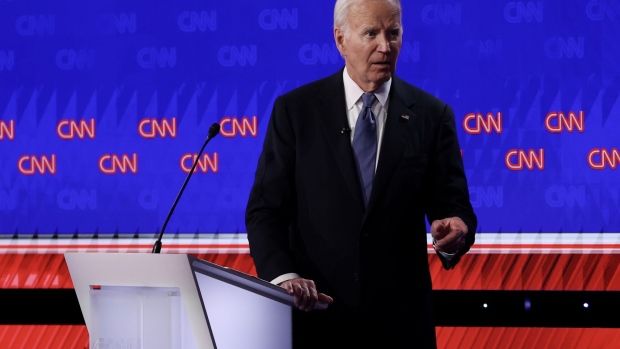Jun 28, 2024
Democrats Question Replacing Biden: Here’s How It Could Work
, Bloomberg News

(Bloomberg) -- An alarmingly poor debate performance by President Joe Biden is raising new questions about whether Democrats have alternatives to retaining the 81-year-old incumbent as their candidate in the November presidential election.
Biden has already won sufficient support in primaries to secure the Democratic nomination for the presidency. The party has little time left to change course before it’s scheduled to name its nominee in advance of Aug. 7 and begin its national convention Aug. 19 in Chicago.
Suffering from what aides said was a cold, Biden spoke hoarsely in the June 27 debate in a halting and sometimes disjointed manner, a performance that renewed concerns about his ability to serve a second four-year term. By contrast, his opponent, former President Donald Trump, 78, was energetic, though his statements were riddled with falsehoods.
Here’s how the discussions about Biden’s future could play out.
What if Biden steps down before he’s nominated?
He said he won’t, both after the debate and the next day at a rally.
But there is a precedent. President Lyndon Johnson, a Democrat, decided not to seek nomination for a second full term in 1968, as protests against the Vietnam War mounted. In an Oval Office speech, Johnson made the surprise announcement that “I shall not seek, and I will not accept, the nomination of my party for another term as your president.” Instead, the Democrats nominated Hubert Humphrey, who was defeated by Richard Nixon.
Johnson’s decision came at the end of March — at a time when the process for determining the major parties’ presidential nominees wasn’t nearly as front-loaded as it is today. Unlike Biden, Johnson hadn’t yet secured enough delegates to nail down the nomination.
Can Biden be removed from the ticket?
It would be difficult.
To become the Democratic presidential nominee, a candidate must win the vote of a majority of the roughly 3,900 delegates to the party’s national convention who are pledged to support a certain candidate. In his party’s primaries, Biden faced minimal opposition and secured 99% of the pledged delegates.
The delegates’ pledges aren’t binding. But absent extraordinary circumstances — and a backup plan — it’s unlikely they would remove him from the ticket.
There are more than 700 other delegates — called super delegates — that are not required to commit to any candidate and are able to vote if the convention is contested and goes to a second or additional ballot.
Any challenger to Biden would have to announce his or her candidacy before the formal vote, publicly challenging the incumbent in a high-stakes attempted party coup.
When must a decision be made?
Soon. The Democratic National Committee (DNC) had already planned to move up Biden’s nomination via a phoned-in roll call ahead of the convention to satisfy an Aug. 7 ballot deadline in Ohio. The Republican-led Ohio legislature has extended that deadline. Before the debate, Democratic Chairman Jaime Harrison said the party would go forward with the early roll call.
What if Biden steps down as the nominee after the convention?
The decision to replace him would be made by the DNC, which is made up of more than 400 party leaders from all the US states and territories.
The party would then face another challenge: printed ballots with Biden’s name already on them.
Laws vary by state about how a vote for Biden would be counted if he’s no longer the nominee, but his votes would likely go to his replacement when the Electoral College meets.
Who are the possible successors?
Vice President Kamala Harris is the most logical heir-apparent, but she wouldn’t automatically get the nod.
Other possible candidates — who deferred to Biden and continue to publicly support him — include California Governor Gavin Newsom, Illinois Governor J.B. Pritzker and Michigan Governor Gretchen Whitmer.
None of those names have polled any better against Trump than Biden does, according to a Bloomberg News/Morning Consult poll of seven battleground states.
What about the money?
Modern presidential campaigns are hugely expensive undertakings, and financial considerations would play no small role.
Biden’s campaign and party had $212 million cash on hand at the end of May, and that money would be available to Harris should she take over the top of the ticket. Any other candidate would likely have to start from scratch.
Biden’s campaign and the Democratic Party have already spent about $346 million trying to reelect Biden. Picking a different nominee could require spending even more money to introduce a new candidate to voters.
--With assistance from Bill Allison.
(Corrects characterization of 1968 election in paragraph 6)
©2024 Bloomberg L.P.







